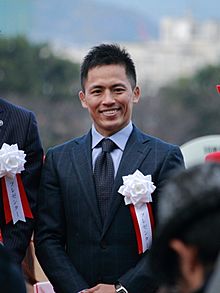Tadahiro Nomura facts for kids

Nomura in 2015
|
|||||||||||||||||||||||||||||||||||
| Personal information | |||||||||||||||||||||||||||||||||||
|---|---|---|---|---|---|---|---|---|---|---|---|---|---|---|---|---|---|---|---|---|---|---|---|---|---|---|---|---|---|---|---|---|---|---|---|
| Born | 10 December 1974 (age 51) Kōryō, Nara, Japan |
||||||||||||||||||||||||||||||||||
| Died | Error: Need valid death date (first date): year, month, day | ||||||||||||||||||||||||||||||||||
| Alma mater | Tenri University | ||||||||||||||||||||||||||||||||||
| Occupation | Judoka | ||||||||||||||||||||||||||||||||||
| Height | 164 cm | ||||||||||||||||||||||||||||||||||
| Sport | |||||||||||||||||||||||||||||||||||
| Country | |||||||||||||||||||||||||||||||||||
| Sport | Judo | ||||||||||||||||||||||||||||||||||
| Weight class | –60 kg | ||||||||||||||||||||||||||||||||||
| Achievements and titles | |||||||||||||||||||||||||||||||||||
| World finals | |||||||||||||||||||||||||||||||||||
| Olympic finals | |||||||||||||||||||||||||||||||||||
|
Medal record
|
|||||||||||||||||||||||||||||||||||
| Updated on 30 May 2023. | |||||||||||||||||||||||||||||||||||
Tadahiro Nomura (野村 忠宏, Nomura Tadahiro, born 10 December 1974) is a famous Japanese judoka. He is known for being the only judo athlete in the world to win three Olympic gold medals in a row. He won all his medals in the extra lightweight (60 kg) division.
Contents
Tadahiro Nomura's Journey in Judo
Early Life and Family Connection
Tadahiro Nomura was born on December 10, 1974, into a family deeply involved in judo. His grandfather was a judo teacher in their local area. His father coached Shinji Hosokawa, who won a gold medal at the 1984 Summer Olympics. Tadahiro's uncle, Toyokazu Nomura, also won a gold medal at the 1972 Summer Olympics. He competed in the 70 kg division.
Tadahiro started learning judo at his grandfather's training hall, called a dojo, when he was six years old. He was very good at judo from a young age. He won many local and national competitions while he was in high school. In 1993, he went to Tenri University.
First Olympic Gold Medal
In April 1996, Tadahiro won the All-Japan Selected judo championships. This win earned him a spot on the Japanese Olympic team. He went to the 1996 Summer Olympics in Atlanta, United States. Even though he was not very well-known globally at the time, he surprised everyone. On July 26, 1996, he won his first Olympic gold medal. He defeated Girolamo Giovinazzo using a judo throw called seoi nage.
World Champion and Injury
Tadahiro continued his winning streak in 1997. He won the All-Japan Selected judo championships again. He also won a gold medal at the 1997 World Judo Championships in Paris. This showed everyone he was the best in his weight class.
In 1998, he won the All-Japan Selected judo championships for the third time in a row. However, on January 9, 1999, he hurt his left knee. This happened during the semi-finals of the Jigoro Kano Cup. He had to stop competing for the rest of that year. He used this time to recover from his injury and finish his degree in health education.
Second Olympic Gold Medal
Tadahiro returned to judo competitions in 2000. He won the All-Japan Selected judo championships for the third time. This allowed him to go to the Olympics again. On September 16, 2000, he made history at the 2000 Summer Olympics in Sydney. He became the first judoka in the 60 kg division to win two Olympic gold medals in a row. He defeated Jung Bu-Kyung from South Korea in just 14 seconds. He used a technique called sumi otoshi.
Making History with a Third Gold Medal
In May 2001, Tadahiro married Yoko Sakai, a former model. He took some time off from judo to study in San Francisco. He returned to competition in April 2003. He won the All-Japan Selected judo championships for the fourth time. He then competed in the 2003 World Judo Championships, where he won a bronze medal.
In April 2004, he won the Japanese nationals for the fifth time. This gave him the chance to try for something amazing: a third straight Olympic gold medal. At the 2004 Summer Olympics in Athens, he achieved this incredible feat. On August 14, 2004, he won against Nestor Khergiani from Georgia. This made Tadahiro Nomura the only judo athlete to win three Olympic gold medals in a row. He was also the first Olympic athlete from Asia to win three consecutive gold medals in any sport. This victory also marked Japan's 100th gold medal in the Summer Olympics.
Later Career and Retirement
After his historic win in 2004, Tadahiro took a break from judo competitions. However, on January 10, 2006, he announced he wanted to try for a fourth gold medal. He aimed for the 2008 Summer Olympics in Beijing. He made a comeback by winning an international tournament in the Czech Republic. In 2007, he won the All-Japan Selected judo championships for the sixth time.
However, in 2008, Tadahiro did not qualify for the Beijing Olympics. He was defeated by Daisuke Asano in a qualifying tournament on April 5. The next day, he announced his plan to retire from competitive judo. He had knee surgery on April 25, but it is not known if this injury affected his performance.
Tadahiro later decided to continue his career. He hoped to qualify for the 2012 Summer Olympics in London. But he did not make the team. In August 2015, he officially announced his retirement from judo. He explained that his health no longer allowed him to compete at that level.
After retiring, Tadahiro Nomura gave an honorary black belt to actor Keanu Reeves. This was to recognize Reeves' hard work in learning judo for the John Wick movie series.
See also
 In Spanish: Tadahiro Nomura para niños
In Spanish: Tadahiro Nomura para niños
- List of judoka
- List of Olympic medalists in judo
- List of multiple Olympic gold medalists
- List of multiple Olympic gold medalists in one event
- List of multiple Olympic medalists in one event
 | DeHart Hubbard |
 | Wilma Rudolph |
 | Jesse Owens |
 | Jackie Joyner-Kersee |
 | Major Taylor |

